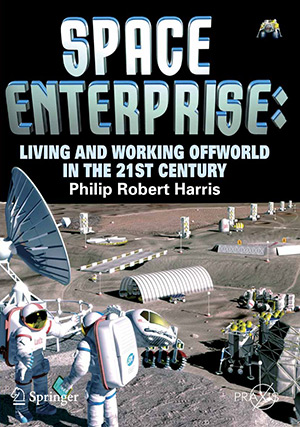Category: Non-Fiction
Reviewed by: David Brandt-Erichsen
Title: Space Enterprise: Living and Working Offworld in the 21st Century
Author: Philip Robert Harris
NSS Amazon link for this book
Format: Paperback
Pages: 672
Publisher: Springer-Praxis
Date: 2009
Retail Price: $39.95
ISBN: 0387776397
Philip R. Harris’ book is an excellently referenced compendium of the behavioral and social science issues related to the creation of a spacefaring civilization (a phrase the author uses frequently). It covers a wide range of topics related to human factors in space development and settlement, including physical, psychological, sociological, cultural, financial, political, legal, educational, managerial, and communicational factors.
It is not a book about the technology or the scenarios involved in achieving a spacefaring civilization. Dr. Harris, a management/space psychologist, points out that macromanagement and other social issues can be just as important as the engineering in successfully living offworld, and makes a consistent plea for greater involvement of behavioral and social science professionals in the space arena.
As a good example of the types of subject matter covered in this book, the chapter on “Orbital Deployment Systems” does not discuss the types of spacecraft or other engineering hardware involved, as some people might expect from the title. Rather, it deals with issues such as assessing and recruiting the most suitable people, proper training for space living, physical and social support and monitoring of people in space, and return-to-Earth issues including physical and psychological readjustments and how to optimize debriefings so that future spacefarers can best learn from their predecessors.
This book is a completely revised, updated, and expanded version of the author’s previous work entitled Living and Working in Space: Human Behavior, Culture and Organization (1st Edition 1991, 2nd Edition 1996), and represents the culmination of 40 years of the author’s behavioral science research on space.
All of the chapters of the book have been previously published in professional journals subject to peer review. However, this did not prevent a considerable number of errors from creeping in. Some are just typos, such as SpaceX founder Elon Musk being referred to as “Elton” Musk more than once. But there are also a number of serious errors of fact, such as the suborbital SpaceShipTwo being referred to as an “orbital” craft on page 590 and spending “one day in LEO” [low-Earth orbit] on page 416!
Space Enterprise is intended primarily as a text for professionals and students in both the behavioral and space sciences but can be readily understood by any interested reader and may be particularly useful for managers or engineers looking for a broader perspective on the human interface aspects of space development. Though primarily an academic work, the author’s personal passion for the subject of creating a spacefaring civilization comes through loud and clear throughout the book. There is some duplication of material between chapters, but the upside of that is that each chapter can be consulted independently. The extensive references alone make the book a worthy addition to one’s library.
The book wisely avoids presenting timelines for future development, concentrating on the many human factors that would be common to any space development scenario. Although Gerard O’Neill and Robert Zubrin are referenced several times, there is no description of the ideas contributed by these two seminal thinkers. The book does assume that lunar development will occur first, which is totally consistent with current U. S. space policy. The author was heavily influenced by two works that I also would particularly recommend: (1) Space Resources, NASA SP-509 (see complete online copy), a 5-volume work for which the author was a primary contributor to Volume 4, Social Concerns, and (2) The Moon: Resources, Future Development, and Settlement by Schrunk et. al.
In addition to the book’s main chapters, there are five appendices on special subjects by contributing authors, most of whom are actively involved in NSS. These are:
- “Governance Issues in Space Societies” by George S. Robinson
- “Space-Based Energy: Lunar Solar Power” by David R. Criswell and Philip R. Harris
- “Learning from Space Entrepreneurs” by Thomas L. Matula
- “Health Services Aloft: Space Nurses” by Linda M. Plush and Eleanor A. O’Rangers
- “International Lunar Observatory Strategy” by Steve Durst
The author advocates a synergy between the public and private sectors, but states (page 410) “after 30 years of research on the contents of this book, the author has concluded that it will be private enterprise that truly opens up the space frontier through commerce.”
I was particularly gratified by the author’s acknowledgement of NSS on page 24: “A further helpful effort…was the launching in 2006 by the National Space Society of a public Internet portal offering unlimited access to a comprehensive collection of documents, studies, and other resources concerning space settlement and other related issues (www.nss.org/settlement).”
Thank you, Dr. Harris!
© 2009 David Brandt-Erichsen
Please use the NSS Amazon Link for all your book and other purchases. It helps NSS and does not cost you a cent! Bookmark this link for ALL your Amazon shopping!



















